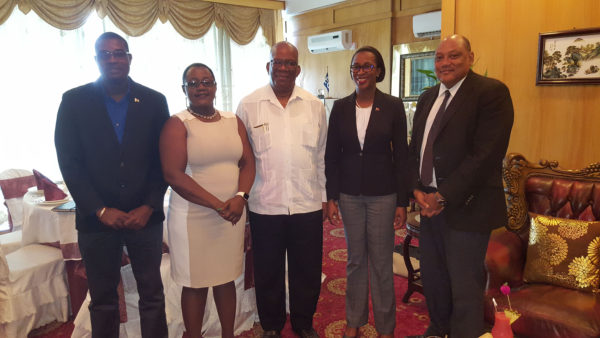The key Memorandum of Understanding (MoU) between the governments of Guyana and Trinidad and Tobago under which the latter will provide various forms of support to the oil and gas sector in Guyana is likely to be signed before the end of this year, Natural Resources Minister Raphael Trotman has told the Stabroek Business.
Trotman also disclosed that a Petroleum Directorate is to be created within the ministry.
The pact between the two Caricom countries, which arose out of an acceptance by Guyana of an offer of wide-ranging technical assistance from Port of Spain in the development of its oil and gas sector will see Guyana receiving support in a range of areas that will include advanced technical training for local personnel in the industry.

Trotman told Stabroek Business that the first draft of the MoU was being prepared in Port of Spain but that the document was expected to take account of the expectations of the Government of Guyana. The permanent secretaries from the two subject ministries in Georgetown and Port of Spain have been assigned to ensure the completion of the document.
Trotman told this newspaper that once the signing of the MoU was completed a high-level visit to Trinidad and Tobago would be undertaken by local officials to formalize the bilateral arrangement.
Financial provision for the creation of the autonomous Petroleum Directorate will be made under the 2017 budget provisions and Trotman told Stabroek Business that his office had already begun to receive expressions of interest in joining the sector from a number of Guyanese living and working abroad. He said he had been impressed by the fact that some of the interested and highly qualified persons appeared prepared to work for smaller salaries than they might otherwise have expected in the oil and gas sector elsewhere.
What could well be the biggest single bilateral agreement between two Caricom countries in any sector will, according to Trotman, embrace a range of areas including oil and gas, infrastructure, education, agriculture and the environment, among others. Trotman said that setting aside the need for Guyana to understand the potential benefits that could derive from the oil and gas industry the engagement with Port of Spain will also embrace ensuring that the advent of the oil industry does not occur at the expense of the agricultural sector. “In fact I envisage that we may be using resources from oil to further develop our agricultural sector,” Trotman said.
Beyond the support that Guyana will receive from Trinidad and Tobago, Trotman also outlined briefly a range of other bilateral support understandings including those with the United States embracing an Energy Governance Capacity Initiative and Canada’s University of Calgary that will develop a policy for the creation of a Sovereign Wealth Fund. Another bilateral understanding with Mexico will see Guyana secure access to three policy papers that will address issues of technical support, regulation and the creation of a Petroleum Institute. The United Nations Development Programme is funding an expert to work in the country’s oil and gas sector.
Various other forms of support will come from the EU, the British think tank Chatham House and the Commonwealth Secretariat which is lending support in the fashioning of several pieces of sector-related legislation which Trotman said are expected to be passed in the National Assembly next year.




